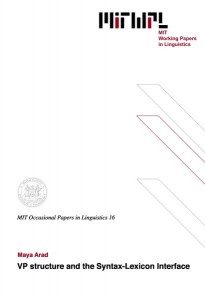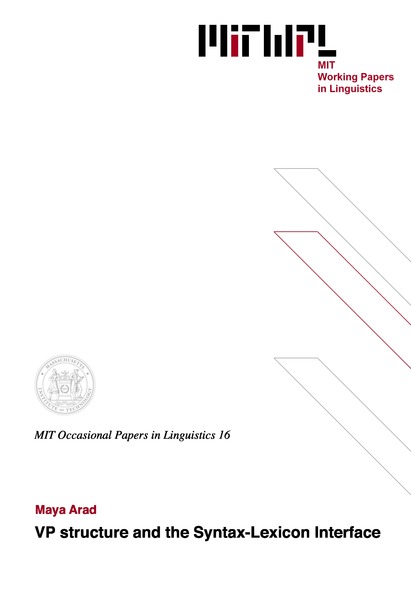MIT Occasional Papers in Linguistics #16
VP-Structure and the Syntax-Lexicon Interface
M. Arad, 1999
Thesis abstract: The thesis is concerned with the correlation between aspects of verbs meanings and aspects of verbs syntax. This research domain is known as The syntax-lexicon interface. Previous work has established a strong correlation between the two. In this thesis, I focus on some cases where the correlation between meaning and syntax is not as simple as with standard verbs. Chapter one introduces the basic approaches to the syntax-lexicon interface, and establishes the approach of the thesis, as a predicate-based, aspectual approach. Chapter two gives an overview of the structure of the VP, the domain in the syntax which interfaces with the lexicon. I give an account of the interaction of the structure of the VP with specific verbs meanings, with special reference to verb alternatives. The next three chapters are case studies of special problematic cases. Chapter three deals with the problem of agents (i.e. wilful actors) vs. causers, which, although structurally indistinct, behave differently with respect to some syntactic phenomena. Chapter four examines the structure of complex, causative verbs; special attention is given to Hebrew causative verbs, where causativization applies more freely than in English. Chapter five discusses psychological verbs (i.e. verbs describing psychological states, such as frighten, amuse), which are known to exhibit different properties from those of standard verbs. Based on the behaviour of such verbs across six languages, I suggest a structure for psychological verbs based on the analogy with ditransitive verbs (cf. insult x and give x an insult). Also, I show that these verbs have special properties only on their stative reading, and that on their non-stative reading they behave like standard verbs. This establishes the role of stativity vs. non-stativity, as well as aspectual properties in general, in determining a verbs behaviour.

